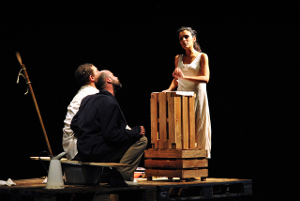

The Youth Association of Idanha-a-Nova came after the then GET-IN theater group (experimental group of Idanha-a-Nova), which was composed of students from the Management School of that locality. The most visible face of the "Ajidanha" has been the amateur theater group, however, the association holds workshops, projects and other activities related to culture among the local people.
How does merges as the association's theater group "Ajidanha" of Idanha-a-Nova?
Rui Pinheiro: Arises from a group of people decided to create a theater group, also presented two plays on stage and this led to the desire to create the association had focused on youth in a cultural context, why they have emerged more projects like for example, workshops, but in fact what has always been the base was the theater group.
Although it is a non-profit making association, I checked your curriculuns and many of the elements have higher education in the performing arts and others.
RP: There we do, I was in college and took a lot of workshops, meanwhile, since the founding of "Ajidanha" we always worked with theater professionals, whether in workshops or in plays, or light technicians and that with time come to be a practical rule of our association, in al productions some of the actors may not be professionals, but the directors are. We have had several experiences with this type of professionals throughout our history and for us it was a prestigious, at the same time, we worked with them. One such example is the Nuno Pinto Custódio, who is responsible for "Comedy of Art", Rui M. Silva with whom we have worked and we will collaborate again in the begining the year to come and we are currently developing these two projects theater with José Carlos García from "Chapitô," which makes us proud because we finally meet various theatrical techniques. Each of these professionals has its different way of working their artistic message, which further enriches us more.
Tell me a little of this work that is in on stage. These are 3 characters.
RP: Are three castaway's who are in a raft after a shipwreck, it is a hot topic.
Because?
RP: It is a black comedy with a very commom topical, because it adapts to today, there are three "politicians" who are discussing who is going to die to be eaten, because the others are hungry, they need to eat and this It leads to various reflections.
How do they look at the work of other companies with the same characteristics that yours?
Bruno Esteves: The is not an issue of look or look away, the "Ajidanha" has a very particular aesthetic that was set over the years, took some time to look for it and although there is this question to be minimal in terms of setting in actors, the search is the very representation as an actor work. Help followed by a line within the context of the National Theatre, or the Portuguese panorama, which obviously exists in our country theater of numerous different styles, how we looked at the other styles and the like ours? They are mainly technical and we tried also to make an approach to the groups we have as reference, so our projects are based on quality.
How is the audience?
BE: We are marked by roaming either in Portugal or abroad. When we started with production, as we have varied audiences of different cultural contexts we tried to take them into account at the time of creation. Obviously, we are here today our approach to the audience is different than in a tour of Spain, are totally different contexts. Of course, there is work form us and the public that dialogue that is the theater, this representation we do, but it is an adaptation in each show.
Then you consider that the public is more receptive, because there are many more groups that think people will see the plays because it is still art that you cannot do copy / paste?
BE: That depends on a lot, we are talking about an ephemeral art, in the sense that it is necessary the presence of the creator or interpreter, to play it. But that does not mean that its creation, do not copy / paste or do repeating mechanisms. The receptivity of the public does not have to be necessarily related to artistic creation concepts.
RP: It is also a very thankless art, sometimes we make a great effort to move to a place and presented the work within that hour and a half, but is an ephemeral art because you cannot repeat it and let's be clear that we want a lot of people, but this is one of the problems of this art.
How do you make the choice of these texts, you always bet on writing your own plays?
RP: We often work in parts of texts. But throughout our history we 've been writing form the root our plays. This applies to the recent now "OPUS", but also made two pantomime. This was the case of "Western Lusitana Beach ... by uncharted waters" that depicted the history of Portugal, a different point of view and "Let there be Idanha" which portrayed own habits and customs of Idanha-a-Nova, which also resembled to other areas of the country.
How do you see the theater panorama at national level? Or the state of the arts in general?
BE: It's hard to find a stimulating creation artistically.
What are your projects for next year?
RP: For the year, we highlight the co-production that we will perform with the theater group of Pombal, with whom we have a good relationship with a director who has worked with both groups, Rui M. Silva. We intend to continue with our theater festival. Make roaming the two shows we have in the portfolio. But besides these, there are other projects. Each passing year, the group is increasingly interactive in several areas and projects.
http://ajidanha.com/










